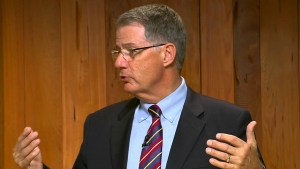This outsized influence of the university on K–12 schools occurs not without precedent. Once before, our nation’s dominant philosophy of education universally altered. Prior to the 20th century, American education was almost universally classical in nature — great books, grammar and rhetoric, . . . Continue reading →
Heidelcast 215: Behind The Scenes Of The Collapse Of The West
We are interrupting our series on prayer, Our Father, to air to a talk I gave yesterday to the Escondido URC Adult Sunday School class. We also got an interesting question on the Heideltext line about the nature of the presence of . . . Continue reading →






